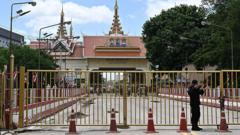The Department of Homeland Security has clarified the circumstances surrounding a French scientist's denial of entry into the U.S., rejecting claims of politically motivated actions from French officials who argue the decision infringes on academic freedom.
French Scientist Denied U.S. Entry; DHS Responds to Claims of Political Motives

French Scientist Denied U.S. Entry; DHS Responds to Claims of Political Motives
French officials claim a scientist's entry was blocked due to political views, but DHS cites security violations as the true reason.
The scientist was reportedly carrying confidential data from Los Alamos National Laboratory, leading U.S. authorities to assert that the refusal was strictly a security breach and not related to his personal opinions on the Trump administration. Tricia McLaughlin, a spokeswoman for DHS, emphasized this point, stating: "Any claim that his removal was based on political beliefs is blatantly false." The academic, specializing in outer space research, was heading to a conference in Texas when he was stopped. Philippe Baptiste, France's minister of higher education, maintains that the incident constitutes a troubling violation of academic rights and free expression.
The scientist, who remains unnamed, allegedly possessed sensitive information downloaded without permission, contradicting his claims that his academic opinions were the cause for detention. Despite seeking to distance his ministry from the incident, Baptiste expressed concern over potential barriers to intellectual exchange between nations and the implications for scientists’ freedom to express their views.
As tensions between the U.S. and France grow, French institutions, including the Academy of Sciences, have voiced alarm over the incident, seeking reassurance that academic freedom is respected in cross-border interactions. Amidst ongoing discussions, the scientific community remains vigilant regarding the protection of intellectual freedoms globally.
Zolan Kanno-Youngs contributed reporting from Washington D.C., and Ségolène Le Stradic from Paris. Aurelien Breeden covers France for The Times.
The scientist, who remains unnamed, allegedly possessed sensitive information downloaded without permission, contradicting his claims that his academic opinions were the cause for detention. Despite seeking to distance his ministry from the incident, Baptiste expressed concern over potential barriers to intellectual exchange between nations and the implications for scientists’ freedom to express their views.
As tensions between the U.S. and France grow, French institutions, including the Academy of Sciences, have voiced alarm over the incident, seeking reassurance that academic freedom is respected in cross-border interactions. Amidst ongoing discussions, the scientific community remains vigilant regarding the protection of intellectual freedoms globally.
Zolan Kanno-Youngs contributed reporting from Washington D.C., and Ségolène Le Stradic from Paris. Aurelien Breeden covers France for The Times.






















